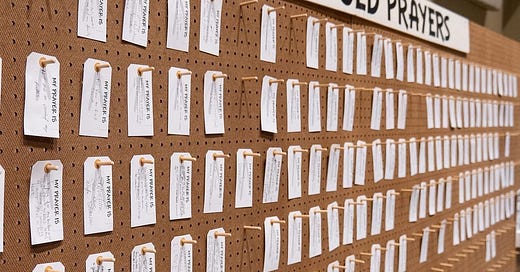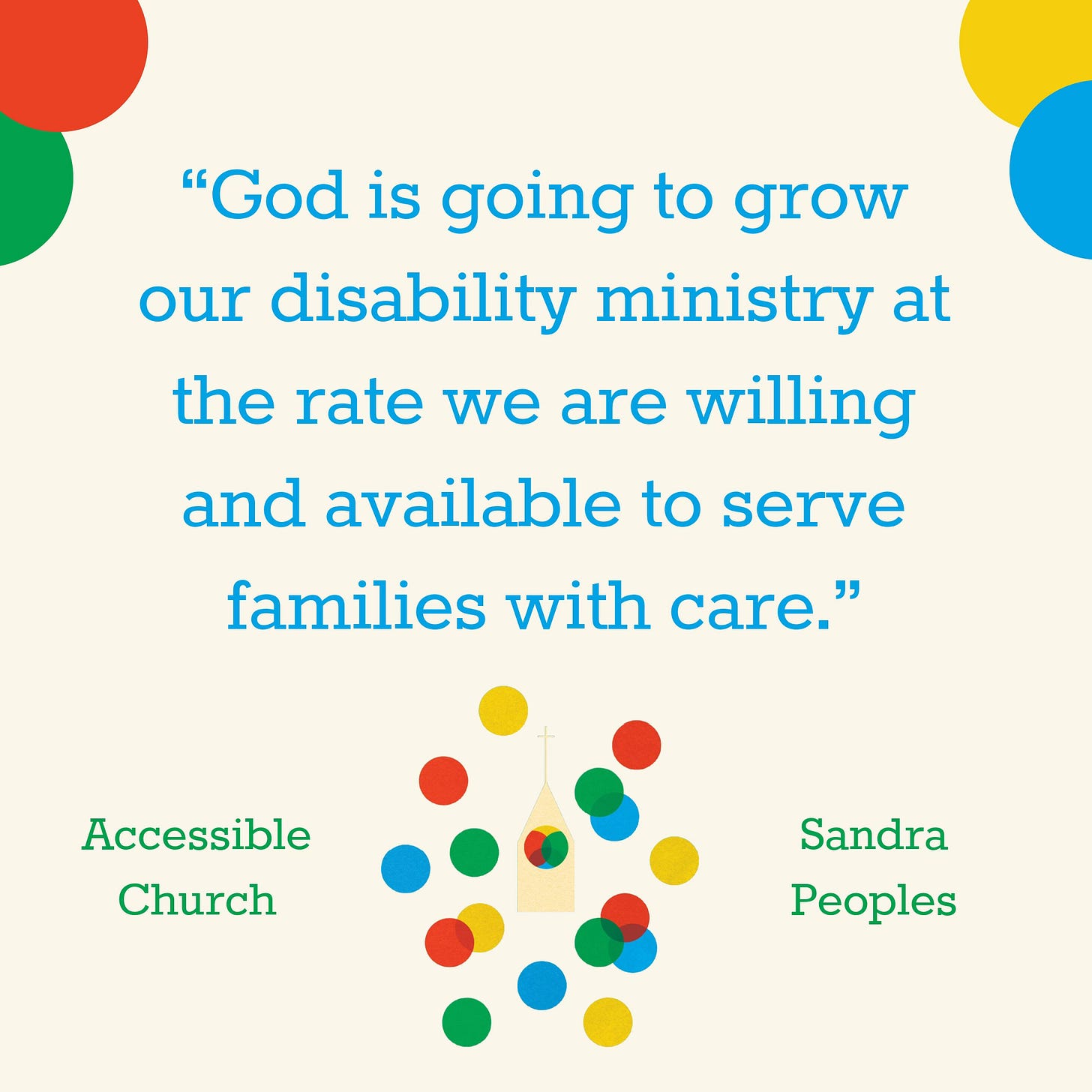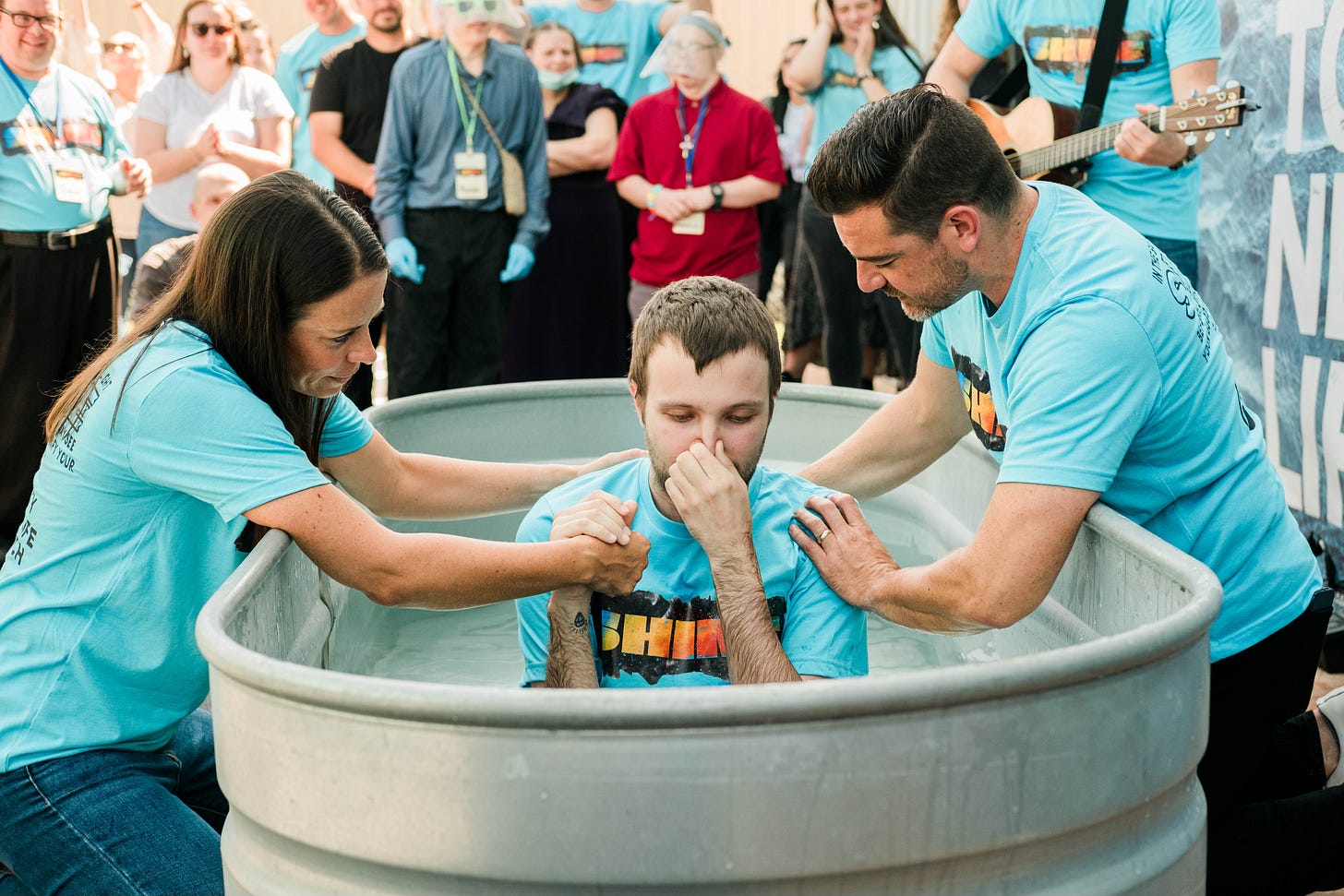How I Pray for My Son's Healing
+Q&A: handling stressed parents, what if too many come, and becoming a consultant
Last week in the Congregational Care in Disability Ministry class I teach at Liberty, one of the topics we covered was healing. My students read from The Life We Never Expected, where Pastor Andrew Wilson writes about four types of healing. Essentially they are:
The type of healing our bodies are constantly doing (like my body healing itself from the flu right now)
The type of healing we consider miraculous (he gives examples of a deaf person being able to hear and a woman in a wheelchair who can suddenly walk)
The type of healing that medical professionals perform day after day in the lives of patients (like during surgery after a car accident)
The type of healing that will come in heaven for those who are in Christ (he includes on his list of conditions that will be healed: autism, Down syndrome, and schizophrenia)
Pastor Andrew writes, “We should expect both miracles and disappointments, physical healing and physical death, to form part of our experience until Jesus returns” (pg 110). It’s part of the tension of living in a time when the Kingdom of God is both now and not yet.
I don’t disagree with his categories for miracles or the tension we find ourselves in during the now and not yet time. My concern when it comes to how we talk about healing from pulpits and in comments under Facebook posts asking for prayer is how disordered our requests can be, sometimes even to the point of hurting those we are praying for. If I look at a person with a disability and only see her need for healing, I can dehumanize her and impede what God is doing in her life and in my relationship with her.
My prayers for James’s healing are a helpful example of this. If over and over, night after night, for years I prayed for his healing from autism, how would that affect my relationship with him? Autism would be the enemy to be defeated by God’s mighty hand, but how can James and his autism be separated? It affects every part of his life. I could become bitter as the characteristics of autism continued to be present in his life, and that would influence how I treated him. So I pray a different way.
My husband has been preaching through a series entitled, “Big God, Bold Prayers.” Over the past few weeks, we’ve been encouraged to write down our big prayer requests on cards and hang them on peg boards around the worship center. Then church members pick up the cards, pray for the requests, and write the date that they prayed on the back.
My bold prayer has been this: “Peace in the lives of family members with anxiety.” It’s really for James, and it has to do with his autism. But instead of praying for healing, I’m praying for a symptom or result of his autism to decrease. There are a dozen other symptoms I could have put on the card: better sleep, less aggression and self injurious behavior, learning new words, eating new foods, more flexibility with his routine, tolerating sock and shoes (and not just Crocs), more independence with self care like bathing and brushing his teeth … And I do pray for these in his life. All of these symptoms are part of his specific autism, but instead of praying against the autism, I’m praying for behaviors, skills, and health.
I can’t separate James from his autism. To ask for healing from it feels like an erasure of who he is. And at what point would I consider him healed? How many words would he have to be able to speak? How high would his IQ need to be? What boxes would he need to be able to check off of an independent living requirement list? Instead of waiting for healing, I can rejoice in each answered prayer we do receive and see evidence of in his life. Becoming more independent with his toileting, communicating his answer to yes or no questions, finding a medicine that helps decrease his frustration all feel miraculous!
We don’t have to wait for ultimate healing to rejoice in what God has done. James doesn’t have to be healed in order to have value or reflect God’s image. When we pray, we can do so in ways that strengthen our relationships with the people we are praying for instead of putting a strain on them. And together we can find God’s grace sufficient.
But he said to me, “My grace is sufficient for you, for my power is perfected in weakness.” 2 Cor. 12:9
This week’s questions:
How can we support stressed out parents, especially in situations when it feels like all eyes are on them?
A ministry leader emailed to talk about a situation at church where a parent got very frustrated with his child, and the children’s ministry staff didn’t know how to intervene. So two people need help in this scenario: the parent and the ministry staff who didn’t know how to help.
For the parent, it’s a matter of discipleship in the area of parenting. One step we've taken is to get all the parents in our disability ministry a copy of the book Triggers: Exchanging Parents' Angry Reactions for Gentle Biblical Responses. We framed it as, "One of our families read this book and really enjoyed it, so we bought copies and are giving them away as a helpful parenting tool." You can also make sure the parent is in a small group with other parents where they are talking about the challenges they face and encouraging each other to exhibit the fruit of the Spirit in their parenting. The family may need to be mentored by another family who can have them over and show them what life looks like at their house.
For the ministry leaders and volunteers who didn’t know what to do in the moment, we can encourage them to focus their attention on the child instead of the parent. It’s less threatening than approaching the parent. For example, I would have addressed the kid when I saw signs that he was not doing what was expected. Maybe given him a fidget or redirected him so his parent could take a moment. If he was on his way into our activities, I would take over the transition. If he was on his way out and going with his parent, I would ask the kid a question or two about his time with us and offer to walk with them toward the parking lot. Often having another adult interact with the child can change the behavior enough to help everyone stay calm.
What if we start a disability ministry, and too many people come?
This question often comes from pastors or ministry leaders who are starting a ministry but are afraid once word gets out that they are open to special-needs families, then they will all show up and overwhelm the church. I get the concern. But dozens of families suddenly showing up rarely happens for two reasons: 1) they have had negative church experiences before and need to build trust before they show up, and 2) they are lost families who need to be evangelized to see their need for a church family.
I have started ministries at two normal-sized churches, and both times the number of families who have come has grown at the rate we have been ready to welcome them. That doesn’t mean we aren’t sometimes scrambling for volunteers or moving people around on a Sunday to meet different needs, but God has always provided help to meet the needs of the families he is bringing to our church. There can be growing pains as we learn to meet the needs of different families, but that would be true of any ministry area experiencing growth. Pray for God to grow your volunteer base as he grows your ministry, and celebrate the growth in both areas!
I want to become a disability ministry consultant. How do I start?
There are really three options for being a ministry consultant: you can work independently, you can work for a parachurch organization, or you can work for your denomination, convention, or association of churches.
The first is probably the hardest when starting out because you’re asking churches to pay you for a service they can get from a parachurch organization for free. For example, if a church in Florida emails me asking for a consultation, they can either pay me or I can recommend they contact Key Ministry and get a free consultation from Beth Golik (because Beth is paid for her time by Key). The second option is to work for one of the parachurch organizations. I worked for Key for years, and that was certainly helpful to prepare me for what I do now. If you work for a parachurch organization, you use their materials and represent them, which is also helpful when starting out. For example, Joni & Friends has lots of helpful resources. You don’t have to reinvent the wheel with every request you get—you can share what your organization has already created. Third, you can work for your denomination, convention, or association of churches. That’s what I do now as the disability ministry consultant for the Southern Baptists of Texas Convention. Those steps can be different depending on the structure of your denomination, but it is certainly a great way to effectively reach and serve churches.
Here are some steps to take as you get started:
Build an email list and send out a helpful newsletter to those contacts at least once a month. Share resources and provide value so they know you can help when they need it.
Make connections in the disability ministry field. Reach out to people who lead ministries at their churches, attend virtual networking events like Key Ministry’s Round Tables, and connect with your local Joni & Friends team.
Attend conferences like Disability and the Church and the Together Conference to continue to get training and make connections.
Read books, listen to podcasts, and consider getting certified or getting a degree in disability ministry.
The number one thing you should be doing if you want to be a consultant is this—be faithful to do the work of inclusion in your local church. Being a good consultant is about the experience you have with different situations and the solutions you have seen work. Like an athlete who practices day after day to be great in the game, you need to get in as many reps as possible doing the actual work of inclusion and support yourself before you can tell others how to do it. There aren’t short cuts. The work is too important.
What I’m reading and listening to:
Why People with Disabilities Are Siloed in the Church and How to Change That from Joni & Friends
How to Help Your Volunteers to Grow Spiritually from Danny Franks (found in last week’s Gospel Centered Family Substack)
The Goodness of God in Scripture sermon by David Platt on Psalm 23
The Lord of Psalm 23: Jesus Our Shepherd, Companion, and Host by David Gibson on audio book
Where Humility Leads to Lots of Home Runs from Christianity Today, about Dallas Baptist University’s baseball program (my son attends DBU!)
In the coming weeks I’m recording videos that will be on my book’s website, accessible-church.com. Each video is from a person or ministry that’s mentioned in the book. As I was forming the questions for Matt and Ginny Mooney (of 99 Balloons) on the topics in chapter 8 (Growing Your Ministry: Marketing and Outreach Ideas), I was thinking about all the ways accessible churches can be a light in their communities. Jeremiah 29:7 is worth remembering when we do things for the good of our cities even if we don’t always see growth in our churches as a result that investment (for example, if we host respite events and families come who never visit on a Sunday morning).
But seek the welfare of the city where I have sent you into exile, and pray to the LORD on its behalf, for in its welfare you will find your welfare.
Thank you for seeking the discipleship of families in your ministry, the health of your church, and the welfare of your city. It makes a difference.








Sandra, thank you for sharing the article about shepherding volunteers!
So good. And so well said.